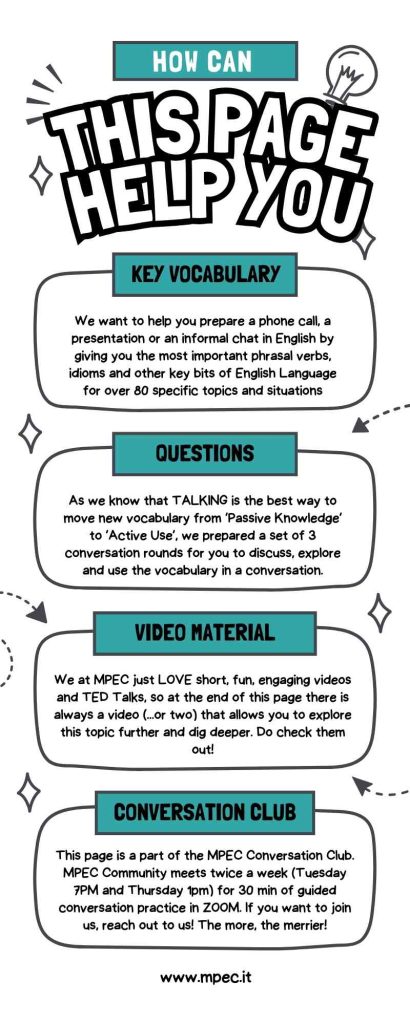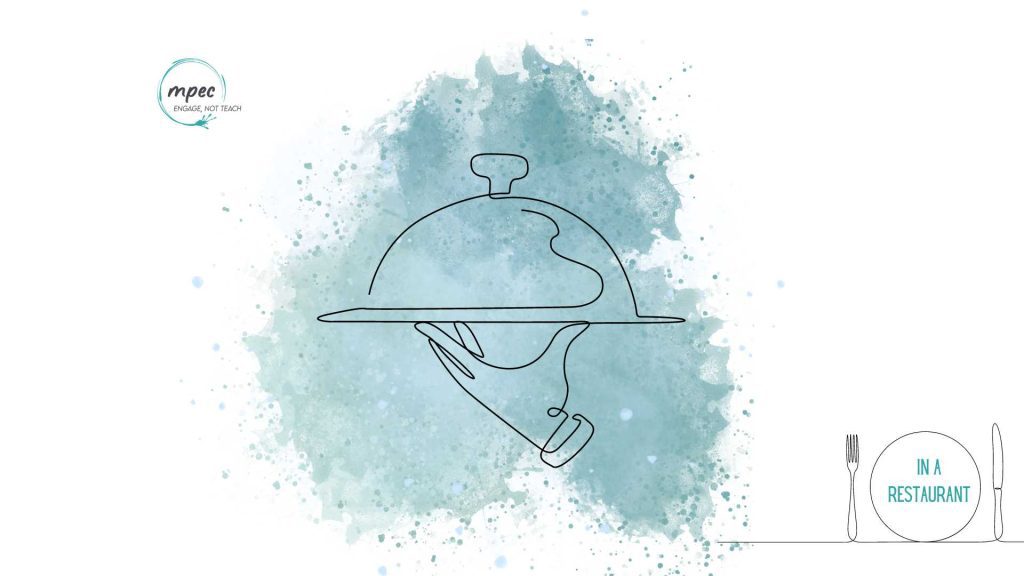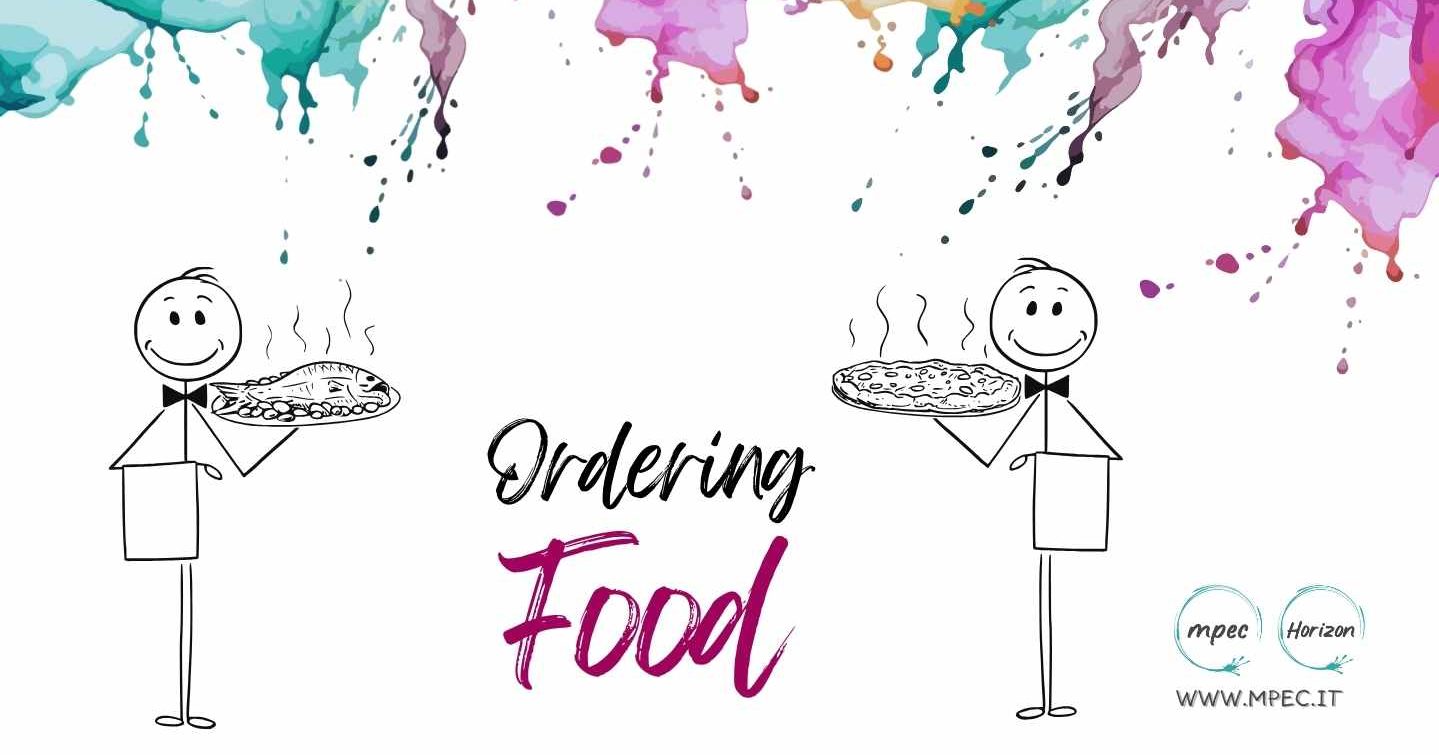We understand that using English in a restaurant might feel a little intimidating at times. However, remember that every step you take is a fantastic opportunity to learn and grow in your language skills. Whether you’re reading the menu, ordering your favourite dish, or interacting with the waiter, embracing these experiences will only make you more confident in using English. Don’t worry if you stumble a bit or feel unsure – everyone starts somewhere. Take a deep breath, smile, and take your time. You’ve got this! The more you practice, the easier it will become. Let’s explore some key phrases and vocabulary to help you feel at ease when dining out. Bon appétit! 🍽️
Prepared with love by: My Personal English Coach


Interacting with the waiters
- “Excuse me…”
- “Could you please explain this dish?”
- “Is there a waiting time for our food?”
- “We’re ready to order.”
- “Could we get some water, please?”
- “Could you recommend a dessert?”
- “Is it possible to split the bill?”
- “Could we have separate bills?”
- “Could you bring some more serviettes, please?” 🍽️
- “Is it alright if we share this dish?”
Need a Course 100% Tailor-made for you?
Asking for the bill
- “Could we have the bill, please?”
- “May I settle the bill?”
- “Could you bring us the bill when you have a moment?”
- “We’re ready to pay, thank you.”
- “Could you split the bill between us?”
- “Can I pay by card/cash?”
- “Do you add a service charge automatically?”
- “Keep the change, please.”
- “Is there a service charge included?”
- “Thank you for the meal. Can we have the bill?”
B1-B2 Keywords for Restaurants
- Starters 🥗: Small dishes served before the main course.
- Main Courses 🍽️: Main dishes of a meal.
- Side Dishes 🍟: Accompaniments to the main course.
- Desserts 🍰: Sweet treats served at the end of a meal.
- Beverages ☕: Drinks, including water, fizzy drinks, juice, tea, and coffee.
- Specials 🌟: Dishes not usually on the regular menu, offered for a limited time.
- Vegetarian/Vegan 🌱: Dishes without meat or animal products.
- Gluten-Free 🌾: Dishes without gluten, suitable for those with coeliac disease.
- Ingredients 🥦: Components that make up a dish.
- Spices/Seasonings 🌶️: Flavours added to enhance taste.
- Grilled/Roasted/Fried 🍳: Cooking methods used for different dishes.
- Mild/Spicy 🌶️: Levels of heat in terms of taste.
- Allergies 🤧: Adverse reactions to specific foods.
- Booking 📅: Reserving a table in advance.
- Special Requests ✍️: Customised orders, like changing ingredients or cooking methods.
Ordering Phrases
- “I’d like to order…”
- “Could I have the…”
- “I’ll have…”
- “I’m interested in trying…”
- “What do you recommend?”
- “Is the (dish) spicy/mild?”
- “Could you make it (gluten-free/vegetarian/etc.)?”
- “Can I get a side of (side dish)?”
- “How is the (dish) prepared?”
- “May I have (drink)?”
- “Could I get some extra (condiment/ingredient)?”
- “I’m not sure yet, can you give me a moment?”

Typical Food on an English Menu
- Fish and Chips 🐟🍟: Deep-fried fish with potato chips.
- Bangers and Mash 🌭🥔: Sausages with mashed potatoes.
- Roast Beef and Yorkshire Pudding 🍖🧁: Traditional Sunday roast.
- Shepherd’s Pie 🥧: Minced meat topped with mashed potatoes.
- Full English Breakfast 🍳🥓: Bacon, eggs, sausages, beans, and more.
- Afternoon Tea 🫖🍰: Assorted teas with sandwiches, scones, and pastries.
- Ploughman’s Lunch 🍞🧀: Bread, cheese, pickles, and more.
- Steak and Kidney Pie 🥩🥧: Savoury pie with beef and kidneys.
- Scotch Egg 🥚🍳: Hard-boiled egg wrapped in sausage meat and breadcrumbs.
- Black Pudding 🍽️🩸: Blood sausage made with pork blood and oatmeal.
10 Idioms (with definitions and sample sentences)
- On the house: This means that something is complimentary or free of charge.
- “We’re offering you dessert on the house as a special treat.”
- Cooked to perfection: Refers to food that has been prepared flawlessly.
- “Our chef ensured that your steak is cooked to perfection.”
- In the doggy bag: This idiom means to take leftover food home in a container.
- “Would you like us to put the rest of your meal in a doggy bag?”
- The proof is in the pudding: This means that the true value or quality of something can only be judged when it’s put to the test.
- “Is she the best of all time? The proof is in the pudding—and I think her accomplishments speak for themselves“
- Cry over spilled milk: To be upset over something that has already happened and cannot be changed.
- “I’m sorry about the spilled drink, but there’s no need to cry over spilled milk.”
- Piece of cake: Refers to something that is very easy to do.
- “Splitting the bill among us will be a piece of cake.”
- Bite the bullet: To bravely face a difficult situation or task.
- “Even though the menu is overwhelming, I think I’ll bite the bullet and try the special.”
- In a pickle: To be in a difficult or tricky situation.
- “We’re in a bit of a pickle as the kitchen is out of a key ingredient for that dish.”
- Bring home the bacon: To earn a living or provide for one’s family.
- “With your skills, you’re sure to bring home the bacon in the culinary world.”
- Spill the beans: To reveal a secret or share confidential information.
- “I can’t spill the beans about the surprise dessert, but I promise you’ll love it.”
Here come 10 Phrasal Verbs You May Need When Eating Out
- Call over: To signal or attract the attention of a server to come to your table, often by making a gesture.
- “Could you please call over our waiter? We’re ready to order.”
- Check out: To review the bill or receipt, often with the intention of paying.
- “Let’s check out and get the bill, please.”
- Fill up: To request a refill of a drink or to have a dish topped up.
- “Could you please fill up my water glass?”
- Hold on: To ask the server to wait a moment or pause while you make a decision.
- “Hold on for just a second, I’m almost ready to order.”
- Pass around: To share something, such as a dish or condiments, with the people at your table.
- “Let’s pass around the appetiser and try a bit of everything.”
- Top off: To add a small amount of something, usually to fill up a container.
- “Could you top off my coffee, please?”
- Settle up: To pay the bill or settle the account.
- “We’re ready to settle up and pay for our meal.”
- Break down: To analyze or explain the details of a dish or the menu items.
- “Could you break down the ingredients in this dish for me?”
- Clear away: To remove empty plates, dishes, or used items from the table.
- “Could you clear away these plates when you have a moment?”
- Wrap up: To ask for leftovers to be packaged or to conclude the meal.
- “Could you wrap up the remaining food for us to take home?”
Round 1 – Let’s Warm Up
- Tell your partners about your favourite / less favourite dish. When was the first time you had it? Why do you like / dislike it? Can you prepare it? If so, can you share the recipe? If not, can you recommend a place where they serve it?
IMPORTANT:
- A “dish” is a specific type of prepared food.
- A “plate” is the physical object on which food is served.
- A “serving” is the portion of a dish that’s presented and given to an individual or a group.


Round 2: Let’s Explore it!
- Share a memory of a time when you went out to eat in an English-speaking country. Why was that time memorable? Who were you with? What did you have? Who was your server? Did you interact with them?
- Choose a place (bar, restaurant) that you remember from childhood. Tell your partner about it, explaining what it looked like, why you remember it, how ofter would you visit it, what would you order and why
Round 3: The Final One – We Role Play!

In pairs, take turns participating in a role play. First, one of you will be a sever who will introduce the menu (pdf below)
The other student should place their order, using some expressions from the lists we shared with you. Then, please, switch roles and use the other menu for the 2nd round.

After The Club: The Follow Up
#FluiditàInglese #ApprendimentoInglese #Coaching . #MPEC #languagelearning #bilingualidentity #Englishcommunication #overcomingbarriers #fluency #confidence #personalcoaching #practice #competitiveness #internationalmarket #positiveaffirmations #bodylanguage #vocabularydevelopment #culturalawareness #italiancompanies #trainingprogram #flexibility #individualgoals #coachingprinciples #linguisticidentity #communicationgoals #transformativelearning #italianstudents #learningEnglish #motivation #resilience #selftalk #negativethoughts #languagebarriers #communicationbarriers #formal #informal #formalenglish #soundingformal #formalrequests #acceptingformally





